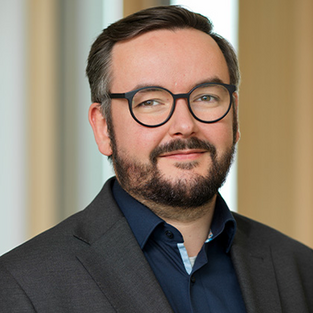innovate! fund

With our “innovate! fund,” we support interdisciplinary groups of researchers who work together to develop application-oriented solutions to existential challenges such as climate change and resource scarcity.
We are particularly looking for projects that are no longer classified as basic research, but are not yet developed enough to be implemented directly by profit-oriented companies—because this is precisely where we see great potential for innovation that often remains untapped.
innovate! fund 2026
The Future of Water: Technologies, Models and Infrastructures of Tomorrow
Water-related innovations are the focus here: Our goal is to permanently secure the availability of and accessibility to water through the use of novel new technologies, models and infrastructure – for example, through new purification methods or technologies which filter out sustainably-usable substances. We are particularly interested in projects that can no longer be categorized as basic research, but are not yet at the point where their work could be directly useful to a profit-oriented enterprise or company.
What we are looking for
We are seeking interdisciplinary groups of researchers who develop concepts for the more efficient use, purification, and availability of water. These may include, for example:
- New technologies for the purification and treatment of (drinking) water that remove micropollutants such as nano- and microplastics, PFAS, or hormones from water
- Forward-looking technologies that utilize water in novel or particularly efficient ways, for instance as a resource in energy technologies
- New methods for the sustainable extraction of usable substances from wastewater, such as nitrate
- Pioneering infrastructures or models for managing water in the landscape
What does the funding offer?
Each project will receive up to €1,000,000 in funding over a maximum period of five years. We also grant a high degree of research freedom, especially with regard to administrative costs and reporting.
Eligible costs include personnel and material costs, infrastructure rental, and travel expenses. Pure administrative costs of the institution involved in the project (overhead) are not eligible for funding.
Who is the funding aimed at?
Eligible to apply are collaborative groups of researchers with a primary focus on the natural and engineering sciences, consisting of at least three doctoral-level researchers from different disciplinary backgrounds. The lead applicant must be affiliated with a university or another research institution (public-law institutions or private non-profit organizations) located in the priority region specified below.
Researchers from other German federal states or from other European countries may also be part of the consortium, provided that a clear majority of the requested funding (approximately 70%) and the collaboration partners (at least two out of three individuals) remain based in or are active within the aforementioned priority region.
The call for proposals is focused on the northern federal states:
- Brandenburg
- Berlin
- Bremen
- Hamburg
- Mecklenburg-Western Pomerania
- Lower Saxony
- North Rhine-Westphalia
- Schleswig-Holstein
- Saxony-Anhalt
Documents
- Generally understandable summary of how the project contributes to smart water management
- Abstract of the project
- Description of the scientific project
- Rough schedule with milestones
- Bibliography
- CVs of the persons involved
- Cost plan
- Consent of the institution to administer the project
Downloads
Application
The call for applications runs until March 31, 2026.
Selection process
The selection process places particular emphasis on transfer- and innovation-oriented criteria. In particular, it promotes ideas with high social and economic exploitation potential that are still in the early stages of technological development.
The evaluation and selection of applications is carried out in a two-stage process:
- In the first step, written applications are reviewed by a jury of experts and transfer specialists appointed by the Joachim Herz Foundation, and a preliminary selection is made.
- The pre-selected applicants are then invited to the Joachim Herz Foundation for a pitch, on the basis of which the above-mentioned jury makes its final selection recommendation.
Criteria
The evaluation criteria include at least the following:
- Innovation Potential: The project outline demonstrates an innovative research approach aimed at developing pioneering solutions to concrete societal challenges. The project is characterized by a high degree of originality.
- Knowledge Transfer:The project outline presents a clear strategy for translating research results into socially relevant applications.
- Interdisciplinarity: The project described in the outline follows a cross-disciplinary approach that clearly demonstrates the shared potential of the involved disciplines.
- Scientific Quality: The project outline formulates a clear research question derived from the current state of research. The applicants’ methods and approach are well-founded and suitable for addressing the research questions.
- Qualifications of the Applicants: The applicants demonstrate outstanding expertise in their field and strong potential for future development. Their previous work and activities provide an excellent foundation for their future research endeavors.
- Societal Relevance: Within the thematic focus, the research project makes a socially relevant contribution to sustainable development in the field of a fossil-free future.
- Sustainability: The research project supports a holistic sustainability approach that balances economic aspects with the preservation of planetary boundaries and social considerations, while adopting a long-term perspective.
Key Dates
All key dates for the 2026 call for proposals at a glance:
- 24 February, 11–12:30 am: Online information session | Register now
- End of June: Pitch presentations at the Joachim Herz Foundation and selection decision
- From 1 September: Start of funding
Contact

Funded projects
Platform chemicals from residual materials
The project BIOPACE shows how mixed waste streams can be transformed into new, sustainable plastics. Biotechnological processes generate chemical building blocks that replace fossil‑based plastics and bind CO₂ over the long term.
Innovative products for climate-friendly building
The project CO2‑BINDER aims to replace fossil‑based building materials with innovative wood‑based construction products. The focus is on developing resource‑efficient, climate‑friendly and recyclable products.
Cultivation of macroalgae for a sustainable bioeconomy
The MAKROBIO project researches the sustainable cultivation of native macroalgae in the Baltic Sea. The algae are intended to grow efficiently and serve as a basis for climate‑friendly bioplastics with new properties.
Novel sensor concepts for agriculture
The project at Kiel University aims to develop intelligent materials. These materials would enable farmers to control the application of fertilizers or crop protection products and minimize environmental damage.
Sustainable polymer and particle platform
The research project aims to make polymers and their production processes more environmentally friendly – especially in the healthcare and agricultural sectors.
Climate and peat soil protection through photovoltaics
Researchers are examining how photovoltaics can offer farmers an economic perspective while fully leveraging climate‑related potential.
BlueMat: Water-Driven Materials
Artificial materials are usually composed of chemical compounds and are often not sustainable. The goal of the project is to develop more environmentally friendly artificial materials.
Photovoltaic future technologies
The research project at the Georgia Institute of Technology in Atlanta (USA) investigates how silicon photovoltaics can be further developed and used more efficiently by integrating insights from various scientific disciplines.